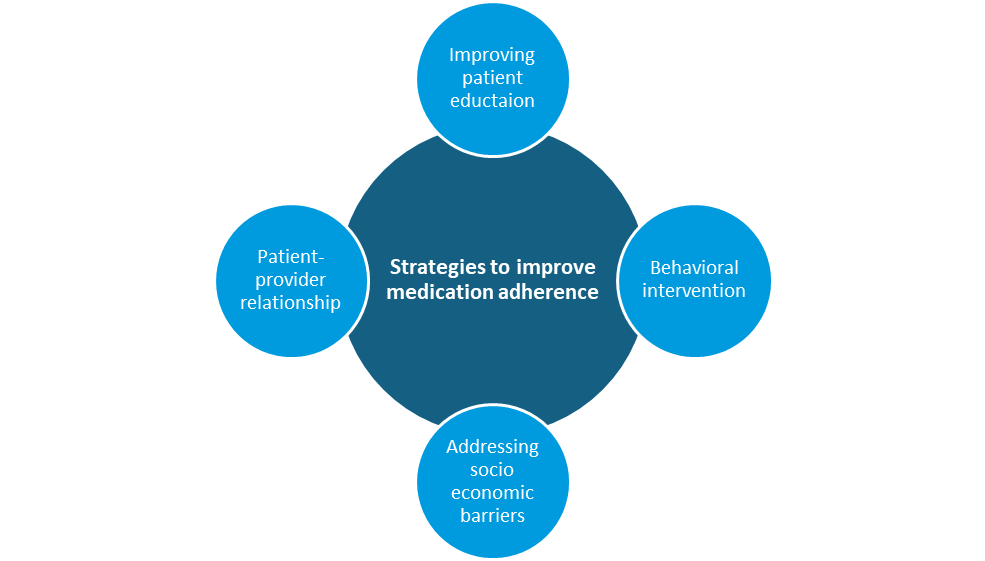Impact of belief and misconception in medication non-adherence
- Belief significantly impacts medication non-adherence by shaping individuals’ decisions regarding whether or not to adhere to prescribed treatments1.
- Considering beliefs is crucial when offering health advice or delivering medical treatment2.
- A multifaceted strategy is essential to address the barriers of medication adherence3.
Beliefs and misconceptions can turn life-saving medications into life-threatening decisions. Let’s understand with few vaccines’ hesitancy example. Firstly,
During the COVID-19 pandemic, vaccine hesitance, driven by concerns over safety, efficacy, income, education, misinformation, and trust in government, significantly hindered vaccination efforts and prolonged the virus’s circulation4. Secondly, rise in anti-vaccination sentiments surrounding beliefs that vaccines cause more harm than benefits to the health of the children who receive them leading to a surprising drop in vaccination rates among some Western countries especially for the disease that were thought to be “eliminated”, such as those against measles. A drop in immunizations poses a threat to the herd immunity the medical world has worked hard to achieve5. The success or failure of medication therapy depends not only on the pharmacological features of the medicine and the patient’s physiology, but also on adherence and belief6. There are multiple factors that influence adherence program. A key among the patient-related factors for non-adherence is beliefs and misconceptions about medications and respective treatments6.
Role of belief in medication adherence
Belief plays a crucial role in medication non-adherence as it influences a person’s decision to follow prescribed treatments1. Individuals who have negative beliefs such as skepticism, hesitancy, and apprehension about the medication’s effectiveness or are concerned about potential side effects may miss doses or discontinue treatment entirely whereas, positive beliefs, such as confidence in the treatment’s efficacy and trust in healthcare providers, tend to promote adherence, eg. in elderly hypertensive patients7. Addressing an individual’s beliefs about medication, illness, and health management is an intriguing approach for understanding non-adherence in chronic disease patients1.
To know more please read our previous article: The role of beliefs in non-adherence
Various type of beliefs and misconceptions about medication and disease
There are certain types of beliefs such as personal, culture and religion beliefs that might impact medication adherence.
- Personal beliefs: Personal beliefs about disease encompass both cognitive and emotional representations. Cognitive beliefs are categorized into five core domains: (1) “identity” describes people’s beliefs about the label of disease and symptoms, and sets out the desired outcomes for change; (2) “timeline” refers to the way people think of the time frame of disease, including symptoms and recovery; (3) “consequences” implies to beliefs about the nature and severity of the disease and its impact on daily life; (4) “control” signifies to improve perceptions about the potential of the disease to be cured, prevented; (5) “causes” highlight the people perception towards the possible causes of their condition. Emotional representations are the feelings that emerge owing to disease, such as anxiety and/or depression2.
- Cultural beliefs: The collection of behavioral patterns relating to opinions, manners, and acts, that people of a society have shared and been passed on to successive generations,” could additionally impact the decision-making of patients with chronic diseases to take medication2.
- Religious beliefs: Religiosity often serves to define a sense of connection with the transcendent, sacred, or divine. People who identify with certain religious traditions and practices were found to make healthier choices. Religion has been shown to have a positive impact on reducing treatment resistance. Studies have reported that Organizational religious activities (ORA) can have both positive and negative impacts on medication adherence8.
Research indicates that patients who have a strong belief in the necessity of their medications and have fewer concerns tend to adhere to them better, with beliefs being identified as the most significant predictor of adherence. Patients often establish their own personal experiences, beliefs, and perceptions of their medications, which can then shape their attitudes toward healthcare and the use of medicines9.
Impact and association of belief and misconceptions on medication adherence
Patients’ acceptance of medical advice, including medication use, may be influenced by subjective beliefs about their health condition. Therefore, it is essential to take beliefs into account when giving health advice and/or providing medical treatment2.
Listed below are a few studies showcasing the impact of belief and misconception on medication adherence.
- Study 1: Impact of beliefs about medicines on the level of Intentional non-adherence in patient with hypertension
A cross-sectional, observational study assessed the level of intentional non-adherence among patients with hypertension and determined the relationship between beliefs about medication and the level of intentional non-adherence to treatment in elderly patients with hypertension. The result reported that patients were most concerned about the harm caused by medication, and least concerned about the necessity to take medication (mean score per item 3.49 vs. 2.14). Correlation analysis demonstrated weak correlations between Beliefs about Medicines Questionnaire (BMQ) and Intentional Non-Adherence Scale (INAS): higher scores for necessity were associated with more intentional non-adherence (r = 0.174, p = 0.003), while higher scores for overuse, harm, and concerns were associated with less intentional non-adherence (respectively: r = -0.253, p < 0.001 vs. r = -0.336, p < 0.001 vs. r = -0.351, p < 0.001)10. - Study 2: Impact of personal, cultural and religious beliefs on medication adherence
In an institutional-based cross-sectional study, the impact of personal, cultural and religious beliefs on medication adherence were assessed. The study results revealed that patients with strong belief in the harm of medications were found 4 times more likely to have poor medication adherence than those with weak belief in the harm of medications (adjusted odds ratio (AOR) = 4.027, 95% CI:1.232–13.161, P = 0.021). Patient having strong personal belief regarding the necessity of medications were found to be less likely to have poor medication adherence (AOR = 0.368, 95% CI:0.220–0.615, P < 0.001)1. - Study 3: Impact of personal and cultural beliefs on medication adherence
A systematic review used twenty-five articles that met the inclusion criteria from August 2018 and rechecked in May 2019. The result of the study reported that a number of personal and cultural based factors were significantly associated with adherence to medication regimes: 40% of articles focused on illness perception, 20% on health literacy, 16% on cultural beliefs, 12% on self-efficacy, 16% on spiritual and religious beliefs, and 20% on illness knowledge2.
Factors associated with medication beliefs
- Benefit vs risk: Medication-taking behavior can be influenced by a benefit–risk analysis in which patients weigh the benefits of medication against the risks associated with medication, such as adverse symptoms11.
- Adherence: Patient with lower beliefs that the medication could treat the illness reported with lower adherence; however, one with greater beliefs in medication effectiveness reported higher adherence11.
- Symptoms and side effects: Symptoms and side effects may be evaluated to determine whether patients stick to their cancer treatment plan because they believe their symptoms outweigh the benefits of taking medicine. Patients experiencing side effects with medicine report higher concerns than those without side effects11.
- Patients-provider relationship: The patient–provider relationship might influence medication perceptions. In a previous study for cancer, patients reported that more frequent physician communication was associated with greater cancer medication necessity beliefs among individuals with breast cancer. However, another study reported that patients may feel inferior to physicians and refrain from questioning their cancer treatment plan out of respect or to prevent confrontation11.
- Previous experience: Medication beliefs might be influenced by previous experiences with health, illness, and medications11.
Addressing belief and misconception to improve medication adherence
Engaging patients in a productive conversation regarding their thoughts and concerns to improve or redesign service delivery according to their experience improve patient efforts to manage their own care12. A variety of strategies to improve medication adherence have been tested in clinical trials, and include the following categories:

Figure: Strategies to improve medication adherence. (This figure was created for illustrative purposes and is based on data obtained from Salmasi S., et al, 2019., Nakao M., et al, 2021., de Abreu Costa M., et al, 2022., Al Meslamani AZ 2024., Drossman DA, 2020.)
- Patient education: Patient education helps facilitate the creation of an honest disease representation, increases perceptions about medications, and enhances knowledge, all of which have been linked to improve adherence13.
- Behavioral intervention: Cognitive–behavioral therapy (CBT) is a type of therapeutic intervention that helps people discover and change negative or disturbing patterns of thought that have an adverse impact on their behavior and emotions14. To address religious belief among patients, Religion-adapted cognitive behavioral therapy (R-CBT) plays a significant role. It involves the adaptation of secular CBT protocols using patients’ religious content, to be more sensitive and client centered. As per the result of a systematic review, where most common religious adaptations were the incorporating religious content into cognitive restructuring, psychological education, and motivation; participation in religious activities such as behavioral activation, meditation, or prayer to aid in cognitive restructuring; and the application of religious values and coping strategies. The study concluded that inclusion of religious issues in psychotherapy is not only feasible but also ethical and must be implemented according to the wishes of each patient15.
- Addressing socioeconomic barriers: Another significant barrier is the cost of medications16. Therefore, policies aimed at reducing these costs, such as subsidizing medications or implementing price controls, could enhance adherence rates. Also, policies that facilitate easier access to healthcare services, through measures such as expanding insurance coverage or improving resource distribution, can significantly affect adherence rates16.
- Patient-provider relationship: The key concepts of good communication (active listening, addressing the patient’s agenda, showing empathy, and validating the patient’s beliefs and concerns) encourage the patient to disclose the clinical and psychosocial information required for diagnosis and treatment. They create a secure environment in which patients can communicate their most personal thoughts and feelings, which may contribute to or cause the condition17.
Conclusion
The balance between perceiving the necessity of medication and concerns about potential harm significantly influences whether patients adhere to their treatment regimen; this balance needs regular reinforcement through patient engagement, education about their condition, the benefits of medication adherence, and the comparatively manageable nature of medication side effects compared to the risks of non-adherence. Addressing beliefs is necessary and it requires a collaborative effort involving healthcare providers, patients, caregivers, and communities. By fostering trust, dispelling misconceptions, and promoting informed decision-making, we can enhance medication adherence, optimize treatment outcomes, and ultimately improve the quality of life for individuals managing chronic and life-threatening illnesses.
“The thing always happens that you really believe in; and the belief in a thing makes it happen.”
– Frank Lloyd Wright













